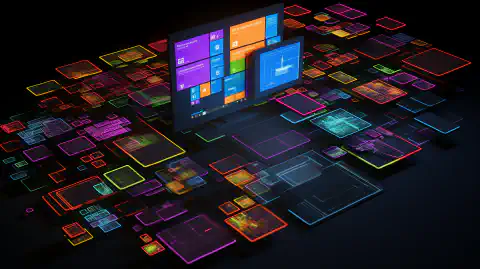Endpoint Security Showdown: Symantec vs. McAfee - A Comprehensive Comparison

Table of Contents
Endpoint Security Showdown: Symantec vs. McAfee
In today’s cyber threat landscape, endpoint security is more critical than ever before. With the proliferation of sophisticated cyber attacks, cybercriminals are continually exploiting endpoints, such as laptops, mobile devices, and servers, to gain unauthorized access to sensitive information and systems. Therefore, organizations must deploy robust endpoint security solutions that can safeguard their digital assets against such threats. In this article, we’ll compare two of the leading endpoint security vendors-Symantec and McAfee-and assess which one is best suited for your organization’s security needs.
Introduction to Endpoint Security
Endpoint security refers to the security measures deployed at the end-user devices and servers to protect them from potential cyber threats. These security solutions use multiple technologies such as antivirus, firewall, intrusion detection & prevention, and encryption to secure endpoints against malicious activities. Endpoint security also provides comprehensive visibility into endpoint activities, blocking unauthorized access to networks and applications, and preventing data breaches.
As the world becomes increasingly digital, endpoint security has become a critical aspect of cybersecurity for all organizations. With more devices and endpoints connected to networks than ever before, the potential for cyber attacks has increased significantly. Endpoint security solutions are designed to protect against these threats and ensure that sensitive data and networks remain secure.
The Importance of Endpoint Security
Endpoints are the most vulnerable part of any organization’s digital infrastructure, as they remain exposed to different kinds of cyber attacks such as malware, ransomware, phishing attacks, insider threats, and advanced persistent threats (APTs). These attacks can cause significant damage to organizations, resulting in data breaches, financial losses, and reputational damage.
Whether your employees are working remotely or on-premises, endpoints are the primary targets for hackers seeking to infiltrate your organization’s systems. Therefore, organizations must deploy robust and comprehensive endpoint security solutions to mitigate these risks and protect their sensitive data, applications, and networks.
Endpoint security solutions provide organizations with a range of benefits, including:
- Real-time visibility into endpoint activities
- Protection against cyber threats and vulnerabilities
- Prevention of data breaches and data loss
- Compliance with regulatory requirements
- Improved overall security posture
Key Components of Endpoint Security Solutions
Endpoint security solutions typically consist of multiple components, including antivirus, firewall, intrusion detection & prevention, encryption, and data loss prevention. These components work together to provide comprehensive protection against cybersecurity threats and vulnerabilities.
Antivirus software is a critical component of endpoint security solutions. It can detect and neutralize known malware, preventing it from infecting endpoints and spreading throughout the network. Firewalls protect against network attacks by blocking unauthorized access to networks and applications, while intrusion detection & prevention provides real-time visibility into network traffic, allowing organizations to detect and respond to threats quickly.
Encryption provides an additional layer of protection for sensitive data, ensuring that it remains secure even if endpoints are compromised. Data loss prevention technologies prevent data leakage from endpoints, ensuring that sensitive data does not leave the organization’s network.
Endpoint security solutions also typically include endpoint management and monitoring capabilities, allowing organizations to manage and monitor endpoints from a central location. This provides organizations with greater visibility into endpoint activities and enables them to quickly respond to threats and vulnerabilities.
In conclusion, endpoint security is a critical aspect of cybersecurity for all organizations. With the increasing number of endpoints connected to networks, the potential for cyber attacks has increased significantly. Endpoint security solutions provide organizations with comprehensive protection against cyber threats and vulnerabilities, ensuring that sensitive data and networks remain secure.
Symantec Endpoint Security
Overview of Symantec Endpoint Security
Symantec Endpoint Security is an all-in-one endpoint security solution that provides comprehensive protection against cyber threats and vulnerabilities. It is a highly advanced solution that includes antivirus, firewall, intrusion prevention, and data loss prevention technologies. Symantec Endpoint Security’s cloud management console allows admins to manage the endpoint environment and security policies from a centralized location, providing complete visibility and control over endpoint security.
Symantec Endpoint Security is designed to protect against a wide range of threats, including malware, viruses, spyware, and ransomware. It uses advanced threat protection, machine learning, and behavior-based analytics to detect and stop zero-day attacks without the need for signature updates. Its proactive threat prevention capabilities help to identify and mitigate new and emerging threats in real-time, ensuring that your endpoints are always protected.
Key Features and Benefits
Symantec Endpoint Security’s key features include advanced threat protection, machine learning, and behavior-based analytics. Its proactive threat prevention capabilities detect and stop zero-day attacks without the need for signature updates. It uses machine learning algorithms to analyze threat behavior patterns and identify new and emerging threats in real-time. Symantec Endpoint Security’s cloud management console allows for easy deployment, management, and automatic updates. Other benefits of Symantec Endpoint Security include multi-layered protection, easy deployment, and automatic updates.
Symantec Endpoint Security also offers advanced data loss prevention capabilities, which help to prevent data breaches and protect sensitive information. It provides comprehensive visibility into data usage and helps to enforce data protection policies across the organization. This helps to ensure that sensitive data is protected at all times, even when it is being accessed or shared by employees.
Pricing and Licensing Options
Symantec Endpoint Security’s pricing and licensing are flexible, based on the number of endpoints and licensing terms. Symantec offers a remote deployment service to ease the deployment process and provide ongoing support and maintenance. This service ensures that your endpoints are always up-to-date and protected against the latest threats.
Overall, Symantec Endpoint Security is an advanced, all-in-one endpoint security solution that provides comprehensive protection against cyber threats and vulnerabilities. Its advanced threat protection, machine learning, and behavior-based analytics capabilities ensure that your endpoints are always protected, while its cloud management console makes it easy to manage and deploy the solution across your organization.
McAfee Endpoint Security
In today’s digital age, cyber threats and vulnerabilities are becoming more sophisticated and frequent. As a result, it is critical for organizations to have comprehensive endpoint security solutions in place to protect against these threats. McAfee Endpoint Security is one such solution that provides robust protection against advanced cyber threats and vulnerabilities.
Overview of McAfee Endpoint Security
McAfee Endpoint Security is an all-in-one endpoint security solution that offers a comprehensive suite of security features, including antivirus, firewall, intrusion prevention, and data loss prevention technologies. Its centralized management console provides complete visibility and control over the endpoints, policies, and security events.
With McAfee Endpoint Security, organizations can rest assured that their endpoints are protected against a wide range of threats, including malware, ransomware, phishing attacks, and zero-day exploits. Its advanced security features and threat intelligence capabilities ensure that organizations can stay one step ahead of cybercriminals.
Key Features and Benefits
McAfee Endpoint Security’s key features include machine learning, real-time analytics, and zero-day threat prevention. Its machine learning algorithms analyze threat behavior patterns and identify emerging threats in real-time. Its behavioral analytics monitor user activity and network traffic to detect potential threats. McAfee Endpoint Security’s threat intelligence shares real-time threat information with the other security solutions in the environment, reducing the risk of a successful attack.
One of the additional benefits of McAfee Endpoint Security is its ease of deployment. The solution can be easily deployed across the organization, and its automatic updates ensure that endpoints are always protected with the latest security patches. Its centralized management console also provides complete visibility and control over the endpoints, policies, and security events.
Pricing and Licensing Options
McAfee Endpoint Security’s pricing and licensing are flexible, based on the number of endpoints and licensing terms. The cost structure is transparent, and McAfee offers a range of licensing, including subscription-based models to suit different budgetary requirements. This makes it an ideal solution for organizations of all sizes, from small businesses to large enterprises.
In conclusion, McAfee Endpoint Security is an all-in-one endpoint security solution that provides robust protection against advanced cyber threats and vulnerabilities. Its advanced security features, threat intelligence capabilities, and ease of deployment make it an ideal solution for organizations looking to protect their endpoints against a wide range of threats.
In-Depth Comparison: Symantec vs. McAfee
Protection and Detection Capabilities
Both Symantec and McAfee offer robust protection and detection capabilities against common endpoint-related cyber threats such as malware, ransomware, and phishing attacks. Symantec Endpoint Security utilizes advanced threat protection, machine learning, and behavior-based analytics to detect threats faster and more effectively. The machine learning algorithms used by Symantec Endpoint Security help it to identify and stop threats before they can cause significant damage.
McAfee Endpoint Security offers similar threat protection capabilities but also includes a threat intelligence sharing function, which enables it to share real-time threat information with other security solutions deployed throughout the environment. This allows for a more comprehensive approach to threat detection and response, as multiple security solutions can work together to identify and stop threats.
Performance and System Impact
Both solutions have been optimized to reduce system overheads and impact on end-user devices. Symantec Endpoint Security uses machine learning algorithms to identify and stop threats, so it requires less CPU usage than traditional antivirus software. This means that end-users can continue to use their devices without experiencing significant slowdowns or performance issues.
McAfee Endpoint Security’s analytics engine has been optimized to provide more significant system performance without compromising security functionality. This ensures that end-users can continue to use their devices without experiencing significant slowdowns or performance issues, even when running multiple security solutions simultaneously.
Management and Usability
Symantec and McAfee provide centralized management consoles that simplify the process of configuring and managing endpoint security solutions from one location. Symantec’s cloud management console is user-friendly and intuitive, allowing admins to manage endpoint policies, updates, and security events with ease. The console also provides real-time visibility into the security posture of the environment, enabling admins to quickly identify and respond to threats.
McAfee’s security management console is also user-friendly but offers a broader range of reporting options and policy settings. However, some users have reported that McAfee’s interface is less intuitive and requires more significant onsite support for deployment and configuration. This can be a challenge for organizations with limited IT resources or those that require a more streamlined management experience.
Integration with Other Security Solutions
Both Symantec and McAfee offer extensive integration capabilities with other security solutions, making it easy to include them in a broader security architecture. They both provide APIs that enable more straightforward integration with security information and event management (SIEM) solutions and other security technologies such as intrusion prevention systems and network access control.
By integrating with other security solutions, organizations can create a more comprehensive security architecture that can detect and respond to threats more effectively. This can be especially important for organizations that operate in highly regulated industries or those that are targets for advanced cyber threats.
Customer Reviews and Testimonials
Symantec Endpoint Security User Experiences
Many users have praised Symantec Endpoint Security’s ease of use and effectiveness as a comprehensive endpoint security solution. Its machine learning algorithms and behavior-based analytics are often cited as strengths, providing powerful protection against zero-day attacks.
One user reported that they were initially hesitant to switch to Symantec Endpoint Security due to concerns about compatibility with their existing systems. However, after implementing the solution, they were pleasantly surprised by how seamless the transition was. They noted that the solution was easy to use and configure, and that the machine learning algorithms were able to quickly identify and respond to potential threats.
Another user noted that they had previously used multiple endpoint security solutions, but found that Symantec Endpoint Security was the most comprehensive and effective. They particularly appreciated the solution’s ability to detect and respond to advanced threats that other solutions had missed.
McAfee Endpoint Security User Experiences
Many users have suggested that McAfee Endpoint Security is a robust solution that provides strong protection against advanced threats. However, some users have reported issues around the product’s installation and configuration process.
One user reported that they had encountered difficulties with the product’s installation process, which had caused delays in their overall security implementation. They noted that the issue was eventually resolved, but that it had been a frustrating experience.
Another user noted that they had found the product’s configuration process to be somewhat complex, requiring significant time and effort to properly set up. However, they also reported that once the solution was properly configured, it provided strong and reliable protection against a wide range of threats.
Overall, while there may be some challenges associated with implementing and configuring McAfee Endpoint Security, many users have found it to be a highly effective solution for protecting against advanced threats. Whether you choose Symantec Endpoint Security or McAfee Endpoint Security, it’s important to carefully evaluate your organization’s needs and select a solution that provides the right balance of protection and ease of use.
Making the Right Choice for Your Organization
Choosing the right endpoint security solution is crucial for any organization. It not only protects your devices and data but also ensures business continuity. The two most popular options in the market are Symantec and McAfee. However, before making a choice, it’s essential to assess your organization’s endpoint security requirements.
Assessing Your Endpoint Security Needs
Endpoint security is critical for any organization that uses devices such as laptops, desktops, servers, and mobile devices. You must identify the number of endpoints you need protecting, the types of devices that will require security solutions, and the criticality of data stored on the device. For example, if your organization deals with sensitive customer information, you might need a solution that provides advanced threat protection and encryption capabilities.
Additionally, consider your budget, IT skills, and expertise, and the level of support that you expect to receive from the vendor. If you have a small IT team, you might need a solution that’s easy to deploy and manage. On the other hand, if you have a large IT team, you might prefer a solution that provides granular control and customization options.
Evaluating Vendor Support and Services
When it comes to choosing an endpoint security solution vendor, a vital consideration is the level of customer support and services provided. Both Symantec and McAfee offer extensive support and services, including remote deployment, regular updates and patching, and technical support. However, it’s essential to consider the level of support that will be provided in your environment and the cost of those services.
For example, if you have a distributed workforce, you might need a solution that provides remote deployment and management capabilities. Similarly, if you have a complex IT environment, you might need a vendor that provides dedicated technical support and customized solutions.
Considering Future Security Trends
Future security trends will undoubtedly impact the endpoint security landscape. Cyber attacks continue to become more sophisticated, and vendors will need to continually adapt their solutions to address new threats. When choosing between Symantec and McAfee, consider the vendor’s history of innovation and product development, and how they plan to address these trends in the future.
For example, Symantec has a history of investing in artificial intelligence and machine learning capabilities to enhance its endpoint security solutions. McAfee, on the other hand, has been focusing on integrating its endpoint security solutions with its broader security platform to provide a more comprehensive security posture.
Conclusion: Symantec vs. McAfee Endpoint Security Showdown
Both Symantec and McAfee offer robust, all-in-one endpoint security solutions that provide comprehensive protection against advanced cyber threats and vulnerabilities. They are highly rated by users and have significant strengths in performance, capabilities, and integrations. When making a choice between the two, it’s essential to assess your organization’s needs, evaluate the level of support and services that you will receive, and consider how the vendor plans to address future security trends. Ultimately, the right choice depends on your organization’s specific endpoint security and budgetary requirements.
| Feature | Symantec Endpoint Security | McAfee Endpoint Security |
|---|---|---|
| Advanced Threat Protection | ✔️ | ✔️ |
| Machine Learning | ✔️ | ✔️ |
| Behavior-based Analytics | ✔️ | ✔️ |
| Zero-day Threat Prevention | ✔️ | ✔️ |
| Cloud Management Console | ✔️ | ❌ |
| Data Loss Prevention | ✔️ | ❌ |
| Integration with Other Solutions | ✔️ | ✔️ |
| Ease of Deployment | ✔️ | ✔️ |
| Automatic Updates | ✔️ | ✔️ |
| Centralized Management Console | ✔️ | ✔️ |
| User-Friendly Interface | ✔️ | ✔️ |
| Support and Services | ✔️ | ✔️ |
| Future Security Trends | ✔️ | ✔️ |






